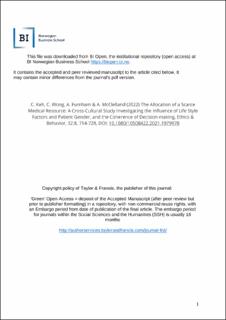| dc.description.abstract | This study examined how lifestyle factors and gender affect kidney allocation to transplant patients by 99 British and Singaporean participants. Thirty hypothetical patients were generated from a combination of six factors (alcohol intake, smoking frequency, weight, exercise frequency, diet, and gender) and randomly paired four times. Participants saw 60 patient pairings and, in each pair, chose which patient would receive treatment priority. A Bradley-Terry model was used to derive coefficients for each factor per participant. A mean factor score (MFS) was then calculated across all participants for each factor. Participants gave lower priority to patients who drank more, were overweight, smoked more and exercised less. A patient’s diet and gender had no significant effect on allocation. There were no significant cross-cultural differences. There were moderate correlations between participants’ self-reported pre- and post-experiment ordering of decision criteria, and these measures and factor coefficients, suggesting a modest level of decision-making consistency. Between participants, moderate levels of concordance with respect to factor importance were observed for self-reported orderings of factors, and weaker agreement for model-derived coefficients. Very similar results were obtained for both British and Singaporean participants, and the implications of the findings are discussed. | en_US |
